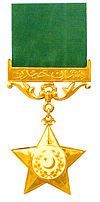Indo-Pak War 1965
Major Raja Aziz Bhatti was posted in the Burki area of Lahore sector during the Indo-Pakistani War of 1965. As the company commander, Major Bhatti chose to move his platoon forward under constant firing from Indian tanks and artillery. For three or more days he went without rest. He resisted for five days and nights defending a Pakistani outpost on the strategic BRB canal.
Shahadat
On 6 September 1965, as a Company Commander in the Burki area of the Lahore sector, Major Raja Aziz Bhatti chose to stay with his forward platoon under incessant artillery and tank attacks for five days and nights in the defence of the strategic BRB Canal. Throughout, undaunted by constant fire from enemy small arms, tanks and artillery, he was reorganising his company and directing the gunners to shell the enemy positions. To watch every move of the enemy, he had to place himself in an elevated position, where he was exposed to Indian fury. He led his men from the front under constant attack from Indian Artillery batteries. Although he tried to counter every Indian offensive in his area, he was hit by an enemy tank shell in the chest while watching the enemy's moves, and embraced martyrdom on 11 September 1965.[3]
A day before his Shahadat (Martyrdom), the commanding officer had sent to him word that since he had been fighting untiringly for the last five days and nights, he should take a little rest and that another officer was being sent to replace him. Major Aziz, who was filled with a battle spirit and the will for martyrdom replied, "Do not recall me. I don't want to go back. I will shed the last drop of my blood in the defence of my dear homeland".[3]
He is buried at his village in Ladian in the Gujrat district.
Each year, Major Bhatti is honoured in Pakistan on 6 September, also known as Defence Day of Pakistan. Major Raja Aziz Bhatti was awarded the Nishan-e-Haider, the nation's highest military award for gallantry for the exemplary courage he displayed till his Martyrdom.






